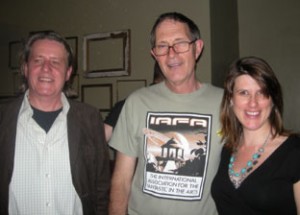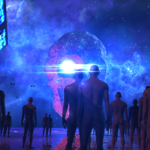In conjunction with New Scientist’s recent special on science fiction, a pub meetup was held with some of the greatest sci-fi writers of the current era. This intimate and relaxed setting was an experiment for New Scientist, we were told, and developed out of a somewhat failed attempt at a much larger event – an outcome that I think worked greatly in the favour of all involved.

Paul McAuley, Geoff Ryman and Alison George
The writers were three of those that participated in the recent issue of New Scientist: Kim Stanley Robinson (famous for his Mars trilogy), Geoff Ryman (author of Air: Or, Have not Have) and Paul McAuley (The Quiet War).
The meetup was of the kind that London does so well – contrasting the massive metropolis with a small room above a pub filled with people talking about things they love. At the beginning, there was a feeling of ‘how is this going to work?’; but as more of us began to mingle, and others began to initiate conversation with the authors, the room began to buzz with the chatter and dynamic that only a pub can offer.
The crux of the evening came from readings by each of the authors. Kim Stanley Robinson read out a recently discovered letter from Virginia Woolf to Olaf Stapledon (author of Star Maker), which showed a side of the almost mythological author that appreciated science fiction greatly. He used this letter to discuss the changes brought within literature, where it shifted from focusing on the very slow (where descriptions of single events could take up dozens, or even hundreds, of pages) to covering a hundred years or even, in the case of Star Maker, the entire history of the universe.
Paul McAuley followed this with a reading from his most recently published book The Quiet War, which has a sequel coming out in a matter of weeks, and also regaled us with anecdotes of sitting briefly within the original ball chair of Number 1 from The Prisoner – “I don’t see how he could have heard anything from in there – he must have had an early iPhone or something”.
Geoff Ryman concluded the trio with a wonderfully theatrical reading of a short piece that he had recently written. Sat atop the bar with his legs dangling below, his gestures and rhythmic phrasing made the piece on future life-blogs feel almost like poetry. A wonderful performance.
Following the reading was some time for Q & A, where many different questions were asked and answered. A common thread throughout many of the answers was that we are really living science fiction now, that the things previously dreamed of were coming to fruition very quickly.
Early genre staples such as interstellar space travel are being replaced with many different avenues of enquiry – such as biotechnology and the new digital world. The merit of HG Wells was remarked by all three writers, highlighting again just how many of the plot devices we take for granted now were created by him.
It also provided a great opportunity for yours truly to put out a question about my absolute favourite author, Philip K. Dick, to Kim Stanley Robinson – who wrote his doctoral thesis on The Novels of Philip K. Dick. I asked which was his favourite PKD book, and also how he felt that his works had influenced him.
After stating that it is obviously difficult to choose just one of PKD’s excellent books – and listing many of the more famous and well-known ones – he settled upon the relatively unknown Now Wait for Last Year. The influence that PKD has had on his work is mostly two-fold, and is something he has spoken about in previous interviews. Mainly, that the characters in PKD’s novels are often just everyday individuals, the little people – a strategy that brings the truth inherent within science fiction out with remarkable efficiency.
He also praised Philip K. Dick for his excellent use of literary structure and the way in which he can utilise different character viewpoints in order to create a more cohesive vision. By shifting perspective we can see not only what a character thinks of themselves, but also gain insight into how others see them – creating a more realised and immersive world.
The festivities ended with many of us continuing to drink and converse until the pub staff could take no more. Overall, it was a fantastic evening and Sumit Paul-Choudhury, Alison George and Rowan Hooper (who was tweeting about the event live) from New Scientist should be commended for planning and hosting the event.
It was one of those moments where you just felt that those around you were really striving to make sense of the human condition and where we may be headed. Obviously, Liz and I are quite partial to such an atmosphere so we really appreciated being able to converse with some truly great thinkers.
Thank you to all the authors involved, and thank you also to the New Scientist team.
[ad name=”Google Adsense-Link Banner x4″]




